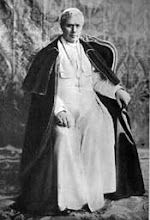Turning and turning in the widening gyre
The falcon cannot hear the falconer;
Things fall apart; the centre cannot hold;
Mere anarchy is loosed upon the world,
The blood-dimmed tide is loosed, and everywhere
The ceremony of innocence is drowned;
The best lack all conviction, while the worst
Are full of passionate intensity.
Surely some revelation is at hand;
Surely the Second Coming is at hand.
The Second Coming! Hardly are those words out
When a vast image out of Spiritus Mundi
Troubles my sight: somewhere in the sands of the desert
A shape with lion body and the head of a man,
A gaze blank and pitiless as the sun,
Is moving its slow thighs, while all about it
Reel shadows of the indignant desert birds.
The darkness drops again; but now I know
That twenty centuries of stony sleep
were vexed to nightmare by a rocking cradle,
And what rough beast, its hour come round at last,
Slouches towards Bethlehem to be born?
W.B. Yeats
Yeats is one of my favourite poets. The sort of poetic prophet, so to speak, for my apocalyptic mood these days and the apocalyptic reality we are about to face too. Pretty soon, I reckon. I had a strange sensation this morning. I was completely sleepless last night. It never came across to me in such a clear way how extremely relevant the poem is for the “here and now”. Perhaps recent readings: Fathers Leonardo Castellani, Antonio van Rixtel and Manuel Lacunza and the Blessed de Liébana were able to set the right atmosphere for a deeper understanding of this poem.
Homage to those ones who can foresee. And foresee in strict accordance to Sacred Scripture, that is to say, with deep sense of the virtue of hope.
And now, as a footnote the English may have imposed their language on the Irish. When one thinks of people like Yeats, Wilde or Brian O’Nolan I think that imposition was worth doing (will my Irish friends forgive me after “approving” of this?). I can hardly think of a more sublime poet in English language than Yeats, an Irishman.
“Slouches towards Bethlehem to be born?”
And best regards to our English-speaking readers who make an effort in Spanish and even in Portuguese to follow A Casa de Sarto. God bless all of them.
Rafael Castela Santos






















